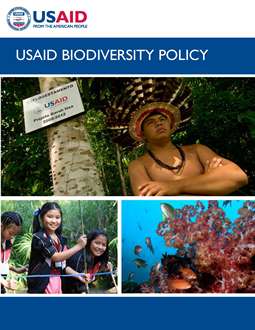For Immediate Release
WASHINGTON, D.C. - Today, U.S. Agency for International Development (USAID) Administrator Rajiv Shah announced more than $210 million to conserve nature in more than 50 countries, including an anticipated $40 million to combat wildlife trafficking, as a first measure in the Agency’s first-ever Biodiversity Policy. The Biodiversity Policy ensures that USAID focuses its work on globally-significant biodiversity, from the Amazon basin to the coral reefs of Southeast Asia, to the vast grasslands of East Africa, applying scientific and research-motivated approaches to support sustainable biodiversity conservation and development outcomes. The announcement was made at an event co-hosted by the International Conservation Caucus Foundation (ICCF). A bipartisan group of Congressional leaders attended the event.
USAID Biodiversity Policy ![]() (pdf - 1014k)
(pdf - 1014k)
“With this new Policy, we are harnessing the power of innovation and proven approaches to effectively protect and manage the environment that supports us – the fertile farms, water basins, and clean air that will sustain our growth and spur our prosperity for generations to come,” said Administrator Shah. “The Biodiversity Policy represents our recommitment to conserve some of the world’s most cherished resources, including swift action to stamp out global wildlife trafficking.”
In Namibia, for example, the poaching of wildlife went unchecked. For 15 years, USAID invested in community conservancies, where local communities were given rights to manage and benefit from their wildlife through activities such as ecotourism. Today in Namibia, wildlife is an economic engine for growth. One out of eight Namibians is a member of a conservancy, which turns additional profits each year. Moreover, wildlife populations in Namibia are rebounding and continue to thrive, and—despite a poaching crisis in other parts of Africa—there is almost no recorded poaching in Namibian conservancies.
At current rates of exploitation, precious resources such as forestry and fishing will not meet human demand over the long term, threatening the ability of families and communities to lift themselves out of extreme poverty, weather environmental shocks, and access clean water. In developing countries, 2.6 billion people depend on fish for protein and income while, worldwide, 1.6 billion people rely on forests. Wildlife populations are also at risk due to poaching and illegal trading, threatening the security and stability of nations worldwide. Often perpetrated by organized criminal networks, poaching and wildlife trafficking can create incentives for corruption as well as threaten nature-based tourism, a major source of livelihoods in many developing countries.
In addition to the $210 million announced today, USAID recently awarded up to of $700 million to seven consortiums comprising more than 50 companies, NGOS and universities to carry out a wide variety of biodiversity and related projects.
The new Biodiversity Policy released today provides a blueprint for how USAID will conduct this important work to conserve nature and promote sustainable, resilient development. Specifically, the Policy focuses on:
- The importance of forging innovative partnerships with the private and public sectors, civil society and academia to leverage resources and skills that can magnify conservation and development results and harness innovations in science and technology.
- Strategic actions to conserve the world’s most important biodiversity, for instance by stamping out global wildlife trafficking.
- A new focus on integrating biodiversity and other sectors, such as economic growth, food security, and health, to achieve greater results.
- A selective, focused and strategic use of biodiversity resources through identifying two tiers of priority countries/regions for biodiversity programming, with at least 50 percent of USAID Biodiversity resources focusing on Tier One countries and regions.
To view the full USAID Biodiversity Policy please click here.
To learn more about USAID’s work in biodiversity, please click here.








Comment
Make a general inquiry or suggest an improvement.